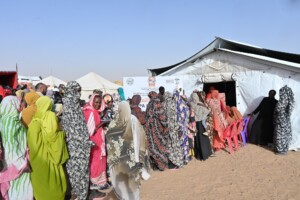‘Human rights violations in Sudan continue’: Huqooq
According to a new report of the Sudanese Rights Group Huqooq, the violations of human rights in the country remain alarming.
According to a new report of the Sudanese Rights Group Huqooq, the violations of human rights in the country remain alarming.
In its report released today [attached below] about the human rights situation in Sudan in June, Huqooq documented violations in Khartoum, White Nile state, eastern Sudan, and Darfur.
The rights violated include freedom of expression, peaceful assembly, and freedom of association, the report reads.
Use of excessive force, arbitrary arrests, torture and other ill-treatment in detention were committed by members of the National Intelligence and Security Service (NISS), the police, the public order police, and the newly formed university police.
Excessive force
In Port Sudan, policemen beat, insulted, and detained lawyer Salwa Abdelhameed on 1 June, when she visited the El Awsat police station for a follow-up concerning a client. When she protested being called ‘you woman’, policemen slapped her, “kicked her with their boots, and punched her on her face, stomach, and back, and insulted her with indecent language”. When she wanted to file a complaint, she was detained in a police cell until the next day.
On 13 June, forces of the riot police, with support of University of Khartoum police agents, dispersed a group of students during their annual Ramadan breakfast gathering with tear gas, batons, and cables. A university professor was beaten as well.
At the Abuzeid Market in Omdurman, a group of policemen in uniform and staff members of the market held and ill-treated Talaleldin Yaseen (18), who just graduated from secondary school, on 18 June.
Yaseen told Huqooq that he was selling clothes at the market, when he was held, beaten, and thrown onto a police truck. He was taken to a room where he was beaten with batons and a whip. “The policemen insulted me with awful insults and they forced me [..] to do knee bends until I swooned.”
When his parents came to his rescue, they were insulted as well. They were detained for six hours, and released on bail, together with Yaseen, pending trial.
Publications, charity
Journalist Mohamed El Amin Osheik was held by the criminal investigation police in Suakin locality in Red Sea state on 12 June, because of his posts on Facebook in which he criticised the commissioner of Suakin for doing nothing about the deterioration of the basic services in the area. Osheik was charged with defamation and released on bail later that day.
NISS officers confiscated the print-runs of Akhir Lahza newspaper on 17, 18, and 19 June, without disclosing the reasons.
On 21 June, the governmental Humanitarian Aid Commission (HAC) in Kassala in eastern Sudan suspended the activities of the Emergency Street Initiative, a Sudanese NGO that has a branch in Kassala registered with HAC.
The Emergency Street Initiative was working on the delivery of an intensive care unit for children to the Kassala Hospital, when the state Ministry of Health ordered the NGO on 14 June to hand the unit to the hospital. After the NGO refused to deliver the unfinished project, NISS officers summoned the organisation’s director to their office in Kassala and froze its activities.
Arbitrary arrests
On 7 June, three members of the Sudanese Congress Party were held at the Sufi Sheikh Homeida Oratory in Khartoum North, following a meeting on the prevention of cholera. Eight NISS officers stormed the oratory and beat the party members. They were taken to a NISS office in the area and questioned. The next morning, they were transferred to the NISS office in Sharq El Nil, where they were released after having been questioned again about the reasons for the campaign and its funders.
In the early morning of 20 June, a group of policemen in uniform and NISS agents in plain clothes detained three students from the dormitory of University of Khartoum. They were beaten with batons on their way to a police station in Khartoum North. The police questioned and insulted them on the basis of their ethnic background. They were released after almost six hours in detention without charges.
NISS agents detained nine members of the Sudanese Congress Party and the chairman of the Popular Committee in Dar El Salam in Omdurman on 27 June, when they were attending a seminar on cholera. They were questioned and released after eight hours.
Public Order police
On 3 June, members of the Public Order police held four young women in the Riyadh district in Khartoum. The women were in a car, waiting for the food they ordered from a nearby restaurant, when policemen violently dragged them from their car. They were taken to the offices of the Public Order police where they were released on bail after three hours.
Charged with the offence of wearing trousers, they were ordered to appear the next day at the East Khartoum Public Order court. The judge told them a lawyer was not needed for the simple case, and sentenced them to a fine of SDG 500 ($75).
Refugees
On 1 June, NISS agents, supported by police forces held about 150 South Sudanese refugees at the market of Kosti in White Nile state, “during a sweep campaign launched by the authorities to evacuate South Sudanese from the town”.
Huqooq interviewed some of them, and they reported about the harsh conditions in detention and the racial insults by the police. After being kept in police custody in Kosti for five days, they were transferred to refugee camps near the border.











 and then
and then